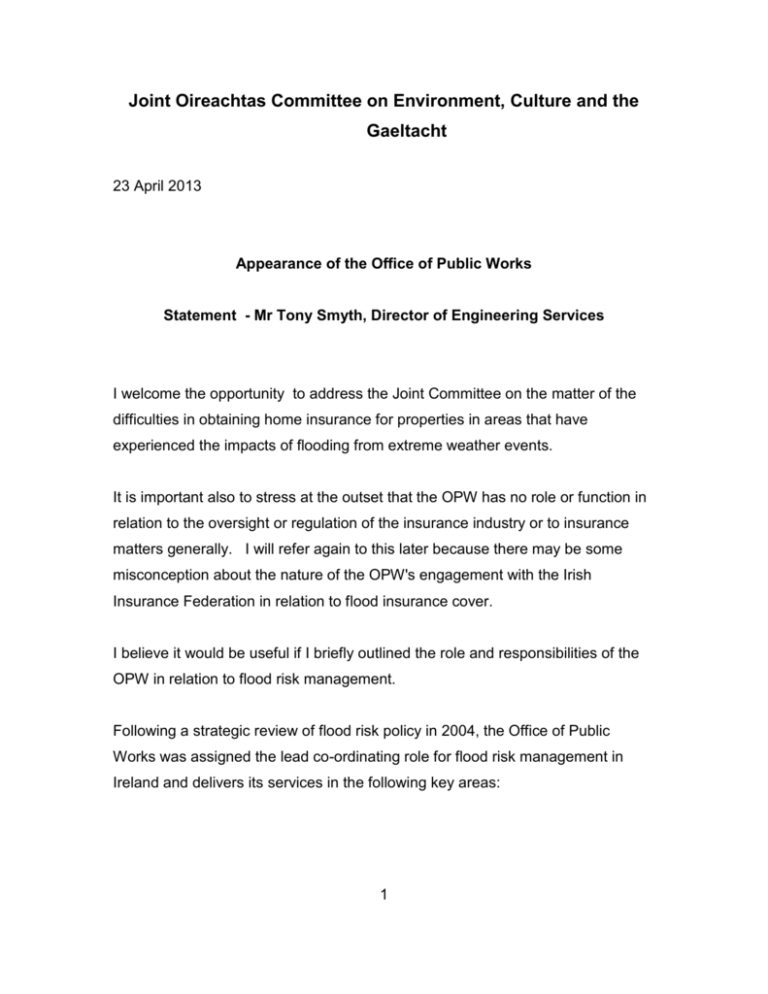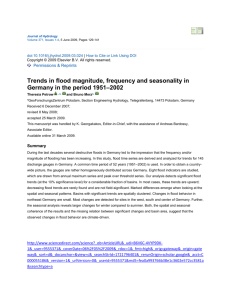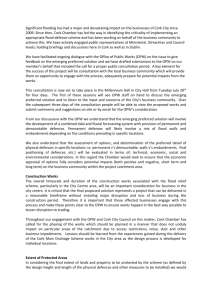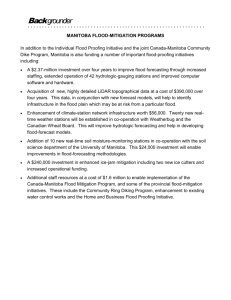Seanad Debate on Flooding and Flood Prevention
advertisement

Joint Oireachtas Committee on Environment, Culture and the Gaeltacht 23 April 2013 Appearance of the Office of Public Works Statement - Mr Tony Smyth, Director of Engineering Services I welcome the opportunity to address the Joint Committee on the matter of the difficulties in obtaining home insurance for properties in areas that have experienced the impacts of flooding from extreme weather events. It is important also to stress at the outset that the OPW has no role or function in relation to the oversight or regulation of the insurance industry or to insurance matters generally. I will refer again to this later because there may be some misconception about the nature of the OPW's engagement with the Irish Insurance Federation in relation to flood insurance cover. I believe it would be useful if I briefly outlined the role and responsibilities of the OPW in relation to flood risk management. Following a strategic review of flood risk policy in 2004, the Office of Public Works was assigned the lead co-ordinating role for flood risk management in Ireland and delivers its services in the following key areas: 1 Strategic planning to manage flood risk into the future under the Catchment Flood Risk Assessment and Management (CFRAM) programme in compliance with the EU Floods Directive and under the Irish Coastal Protection Strategic Studies A programme of Capital Investment to address existing flood risks to properties and infrastructure through major and minor flood relief projects, in partnership with Local Authorities Programmed maintenance of those arterial drainage and urban flood relief schemes completed under the Arterial Drainage Acts, Collection of Hydrometric data to improve the estimation water level flow and to enhance the quality and reliability of flood relief designs and mitigation measures Raise awareness amongst the public and businesses of the risks of flooding and providing information on how to plan, prepare and protect against flood risk Commissioning research into areas related to flood risk management activities. In carrying out its functions the OPW works in close co-operation with other state bodies, principally the local authorities who are the other main players with key responsibilities in relation to flood risk management in the country. In this context it is important to stress that while the OPW and the local authorities work in partnership in many areas, the local authorities are responsible for distinct areas of work in relation to flood risk such as leading the emergency response to 2 flooding, the urban drainage infrastructure and the maintenance of certain water courses and channels. At the core of the OPW's work is the objective of reducing to the greatest extent possible the level of flood risk to people, property, infrastructure and the environment. At a strategic level it is overseeing the most comprehensive national initiative to systematically identify, assess, document and report on the most significant flood risks throughout the country. These assessments, known as CFRAM programme, will generate detailed flood maps showing flood extents and other flood parameters such as depth or velocity. They will recommend an integrated management plan and prioritised measures to address flood problems in areas where there is significant risk in each major catchment in the country. The CFRAM Programme will inform the long-term planning of flood risk management measures throughout the country, including structural/constructed flood defences and non-structural measures. Both the flood maps and the identification and outline design of flood risk management measures under CFRAM will consider a range of potential future scenarios, including the potential impacts of climate change, ensuring that capacity for adaptation is built into the flood risk management strategy and measures. In more immediate terms the OPW is addressing flood risk in critical areas through its Capital Investment Programme for both major and minor alleviation works. Some comments made by invited attendees at the Committee's previous meetings on this matter have suggested that the OPW is not spending enough on flood relief works. I think the figures will show that this is not the case. Under the current Government's Infrastructure and Capital Investment Medium Term Exchequer Framework 2012 - 2016, a total amount of €225 million has been allocated for capital flood relief measures over the 5 year period of the framework. This allocation, when combined with the amount spent by the OPW 3 on flood relief measures since the introduction of the amended Arterial Drainage Act in 1995 of €320m, will result in total expenditure of almost €500 million on flood relief up to 2016. This is a very substantial investment by any standard especially in the current very difficult economic environment and the expenditure to date on flood relief works has brought significant benefits to communities and towns throughout the country. The OPW estimates that over 5,000 properties have benefited from this investment with the estimated benefit in terms of damage and loss avoided amounting to almost €900 million. The insurance industry of course has benefited from this investment also as its very large claims payment costs for flooding of almost €700 million since 2000 would have been very much higher but for the remedial and defence works undertaken by the OPW on behalf of the State. Under its Major Capital Works Programme, the OPW currently has 9 major flood relief schemes at construction stage. It is expected that another five schemes will commence construction before the end of 2013, subject to completion of procurement and other preparatory formalities and availability of funding. There are also a further 26 schemes at various stages of design and planning. Approximately €30million is expected to be expended on all of these schemes during the course of the year. Under the Minor Works and Coastal Protection Scheme, OPW provides funding to local authorities for smaller scale, more localised mitigation measures they wish to undertake in their areas. It is open to any local authority to submit an application to OPW for funding under this admiistrative scheme. Total funding of €21.6m has been approved since 2009 in respect of 400 projects approx. Under the arterial drainage maintenance programme, OPW will continue in 2013 to undertake ongoing maintenance of completed arterial drainage and flood relief schemes 4 At some of the recent previous meetings of the Committee on this matter also some contributors have commented on the delays in getting major flood relief projects off the ground and completed. The OPW appreciates that, especially in the wake of a severe flood event, there can be an expectation that flood mitigation measures can be implemented quickly. It is important to point out however, that major flood relief schemes involve complex engineering and construction operations that can impact on peoples' living, built and natural environment and therefore require lengthy planning and decision lead-in times. The process, defined by legislation, requires that OPW follows a number of stages from feasibility through procurement and public consultation to construction. It is important that the work is done correctly and achieves its objectives. Detailed technical analysis is required to establish the most appropriate solution, technically and economically, from a range of possible mitigation options. Extensive public consultation is required at various stages to ensure that those affected by a scheme have the opportunity to input to its design and implementation. Ecological and archaeological issues often require in-depth analysis to inform the technical solution and to enable the necessary statutory consents to be obtained. Finally, the process and time-scales for procuring consultants and contractors, which is governed by EU law, is onerous and has a prescribed methodology. The OPW at all times strives to expedite and progress capital flood relief works with minimum delay within the resources available to it. I mentioned earlier that there may be a need to clarify the nature of the OPW's current engagement with the insurance industry in relation to the difficulties some people are experiencing in obtaining flood risk insurance. 5 As I indicated, the OPW has no role or responsibility in relation to the oversight or regulation of the insurance industry. The discussions which are taking place currently between the OPW and the Irish Insurance Federation have a very specific focus and are concerned purely with agreeing a basis on which information can be provided to the insurance industry on flood relief schemes completed by the OPW and the standard of protection offered by those schemes. The discussions are taking place in the context of a joint OPW/IIF working group which also includes representatives of the main insurance companies operating in the Irish market. Good progress is being made in the discussions and while there have been a lot of technical details and issues to work through, the groups is nearing agreement on a basis for providing information in an acceptable format which will enable the insurance companies to take this information into account when assessing flood risk to properties. The information being provided is in a readily accessible GIS format which will show in digital map files the areas benefiting from the completed defence works. The initial focus is to provide information on schemes which provide protection for the 1 in 100 year flood. The OPW is satisfied that the insurance industry is engaging constructively and positively in this process and that there is a strong willingness to co-operate to reach agreement on a sustainable system of information exchange. Ultimately, it is a matter for the insurance companies themselves to decide how they will use the information provided on completed flood defence works. As part of the process they are committing to take the information into account in their assessment of risk and it is to be hoped that this will facilitate the provision of flood cover in all areas that are protected by completed schemes. 6 Looking beyond the current process, the comprehensive CFRAM programme to identify and assess flood risk nationally will, in time, provide a level of information which will enable the insurance industry to take decisions on the provision of cover based on the fullest possible assessment of that risk . In conclusion I can say that The Office of Public Works is committed to doing all it can within available resources to identify the measures necessary to manage the risks from flood events. Through the CFRAM programme to identify those risks and through the captial works programme to reduce the exisitng level of risk to properties infrastructure and the environment. I am happy to elaborate on any aspect of this statement. Ends. 7






